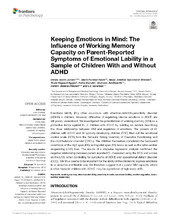| dc.contributor.author | Jensen, Daniel André | |
| dc.contributor.author | Høvik, Marie Farstad | |
| dc.contributor.author | Monsen, Nadja Josefine Nyhammer | |
| dc.contributor.author | Eggen, Thale Hegdahl | |
| dc.contributor.author | Eichele, Heike | |
| dc.contributor.author | Adolfsdottir, Steinunn | |
| dc.contributor.author | Plessen, Kerstin J. | |
| dc.contributor.author | Sørensen, Lin | |
| dc.date.accessioned | 2019-07-30T09:12:55Z | |
| dc.date.available | 2019-07-30T09:12:55Z | |
| dc.date.issued | 2018-10-02 | |
| dc.Published | Jensen DA, Høvik MF, Monsen NJN, Eggen TH, Eichele H, Adolfsdottir S, Plessen KJP, Sørensen L. Keeping emotions in mind: The influence of working memory capacity on parent-reported symptoms of emotional lability in a sample of children with and without ADHD. Frontiers in Psychology. 2018;9:1846 | eng |
| dc.identifier.issn | 1664-1078 | |
| dc.identifier.uri | https://hdl.handle.net/1956/20589 | |
| dc.description.abstract | Emotional lability (EL) often co-occurs with attention-deficit/hyperactivity disorder (ADHD) in children. However, difficulties of regulating intense emotions in ADHD are still poorly understood. We investigated the potential role of working memory (WM) as a protective factor against EL in children with ADHD by building on models describing the close relationship between WM and regulation of emotions. The parents of 41 children with ADHD and 34 typically developing children (TDC) filled out the emotional control scale (ECS) from the Behavior Rating Inventory of Executive Functioning and the child behavior checklist (CBCL). The children themselves completed the backward conditions of the digit span (DS) and spatial span (SS) tasks as well as the letter–umber sequencing (LNS) task. The results of a stepwise regression analysis confirmed the negative relationship between parent reported EL measured using the ECS and scores on the LNS, when controlling for symptoms of ADHD and oppositional defiant disorder (ODD). WM thus seems to be important for the ability of the children to express emotions in an adaptive and flexible way. We therefore suggest that a poorer WM capacity, which is often found in children with ADHD, may be a predictor of high levels of EL. | en_US |
| dc.language.iso | eng | eng |
| dc.publisher | Frontiers | eng |
| dc.rights | Attribution CC BY | eng |
| dc.rights.uri | http://creativecommons.org/licenses/by/4.0 | eng |
| dc.subject | working memory | eng |
| dc.subject | attention-deficit/hyperactivity disorder | eng |
| dc.subject | emotional lability | eng |
| dc.subject | emotion regulation | eng |
| dc.subject | letter– number sequencing | eng |
| dc.title | Keeping emotions in mind: The influence of working memory capacity on parent-reported symptoms of emotional lability in a sample of children with and without ADHD | eng |
| dc.type | Peer reviewed | |
| dc.type | Journal article | |
| dc.date.updated | 2019-01-24T17:49:12Z | |
| dc.description.version | publishedVersion | |
| dc.rights.holder | Copyright 2018 The Author(s) | eng |
| dc.identifier.doi | https://doi.org/10.3389/fpsyg.2018.01846 | |
| dc.identifier.cristin | 1617007 | |
| dc.source.journal | Frontiers in Psychology | |

